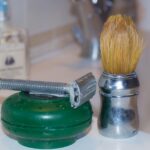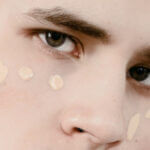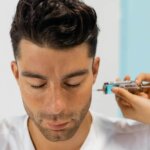Take care of your skin without spending a fortune. Discover budget-friendly skincare tips and tricks for a radiant and healthy complexion.
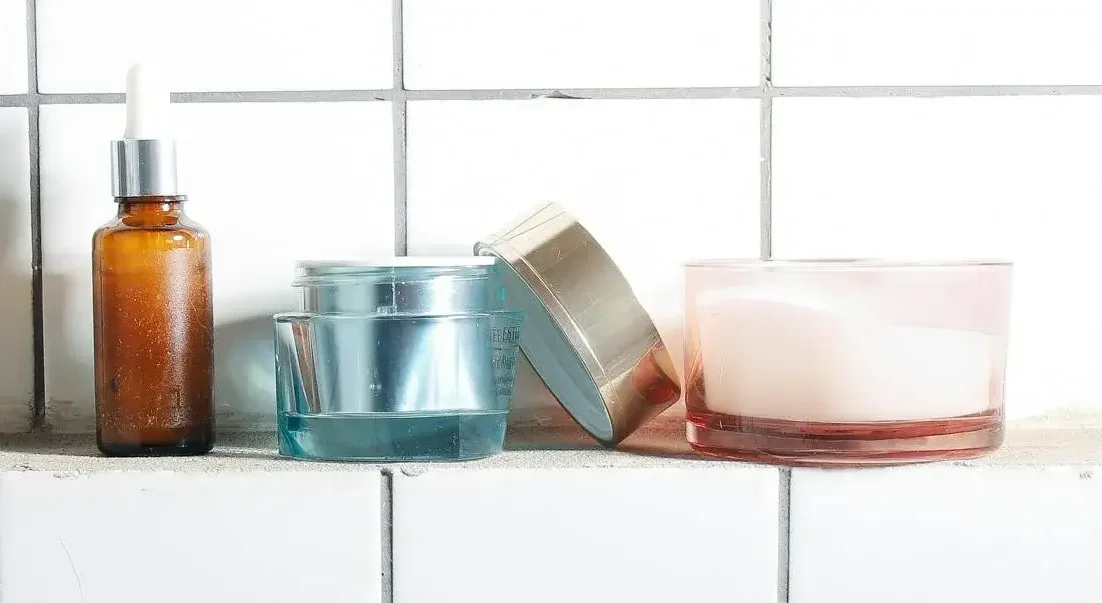
Affordable but Effective Skincare Regardless of Skin Type
Find out why budget skincare products are often just as effective as their high-end counterparts (if not more); how some cosmetic items serve more than one purpose, thus allowing you to save money by purchasing fewer; and how to implement oils for shaving, cleansing, and to mediate skin conditions such as neurodermatitis, sun damage, and acne.
Why Luxury Skincare Products for Men Are Not Better
Many years ago, I found myself in a position where I had to economize. Instead of shopping at the department store where I kept myself up to date with all the latest innovations in men’s skincare, I had to go to the drugstore.
The strange thing is, my skin improved.
Or maybe it’s not so strange, as I discovered through a little research.
For the most part, luxury brands do not owe their commercial success to exceptional quality or efficacy but to celebrity endorsements, pseudo-science, and the perceived value of overpricing.
With their stylish packaging and luxurious textures, high-end skincare items can prove irresistible. And should anyone question their cost, the usual justification is that they contain more of a particular active ingredient than more affordable brands, or an active ingredient that is unique or rare and a possible game-changer.
A good example of such an ingredient is “caviar extract.” This does not mean it’s derived from sturgeon eggs. It could, in fact, be the eggs of any fish. Apart from that, there are other sources of the same skin-firming amino acids contained in fish eggs.
Don’t Shop at the Department Store
If you want to cut costs, skincare is a good place to start. Budget products available at drugstores, including “no-name” brands, are likely to offer the same benefits as anything you’ll find at the department store. In fact, these often prove better than their upmarket counterparts.
The drugstore employs much of the same marketing gimmickry as the department store, although it may be executed in a slightly different way. Therefore, shopping at the drugstore does not guarantee value for money. However, it does offer the opportunity to shop frugally, which the department store does not. It’s just a question of finding the right products.
This obviously involves some experimentation until you find exactly what works best for you. But here are a few pointers so you know where to look and which ingredients to look for (or avoid) if you want to help your skin without hurting your wallet.
Finding Budget Skincare Products
You’ll find countless skincare products at the drugstore, making it difficult to know where to look first. The best place to start is with home brands formulated specifically for your skin type. These you’ll find on the lower shelves.
If it’s a deciding factor, most drugstores also carry their own line of organic products.
I always opt for unscented unisex items. The trouble with cheaper cosmetics marketed specifically for men is that they’re loaded with masculine-smelling fragrances, which can irritate the skin. Apart from that, moisturizers for men are often far too light for very dry skin. The idea is that they should absorb more readily to leave a matte finish.
If you can’t find exactly what you’re looking for or if a home-name product hasn’t achieved the results you’d hoped for, look to the next price category, which you’ll find one or two shelves higher.
But be patient; it will take about a month for a new skincare product to take effect.
Moisturizing Creams
Day Cream
There are moisturizers for every possible skin type, but most important for the daytime is sunscreen, regardless of season.
I live in north-western Europe and find an SPF (sun protection factor) of 15 to be sufficient for both my face and bald head.
Night Cream
For dry or aging skin, make sure your moisturizer is of a heavier consistency for the nighttime. All brands have corresponding day and night creams.
Effective Anti-Aging Ingredients
Skincare products intended to slow the aging process are rarely budget-friendly and employ the most pseudo-science in their marketing strategy, but here are the ingredients that I find most effective.
Dermatologists often refer to retinol as the gold standard in anti-aging skincare. This is vitamin A1 and is sometimes listed in ingredients as retinylpalmitate or retinaldehyde. Until recently, it was restricted to nighttime use but, due to new developments, can now be included in day creams.
Concentrated medical-grade retinol applications are used to treat severe cases of photoaging and acne. These are available only by prescription in most western countries. In other words, neither the drugstore nor the department store can offer this level of efficacy, regardless of price.
Another effective anti-aging ingredient is glycolic acid, an alpha-hydroxy acid that works as an exfoliant.
Caring for Acne-Prone Skin on a Budget
Skincare on a budget is most do-able if you’re acne-prone. Perhaps it’s because sufferers are mostly young and have less money to spend.
For oily, combination, or acne-prone skin, choose a mild, unscented face wash and a water-based moisturizer. Look out, too, for products with glycolic acid.
For more severe acne, creams and lotions with benzoyl peroxide disinfect and prevent blocked pores and hair follicles. If you find these too irritating, try something with salicylic acid, which is a beta-hydroxy acid.
All of these ingredients are contained in sufficient quantities in affordable, home-name brands.
Incidentally, I use a facewash with salicylic acid under my arms to prevent BO and warts, which I seem to be prone to in that area.
Aftershave Lotions and Toners
No matter what your skin type, avoid aftershaves and toners containing alcohol, even if you’re acne-prone. Choose a product for sensitive skin instead.
Use toner on your face after shaving or showering to get rid of any cleansing or soap debris. If you apply moisturizer while your skin is still damp, you’ll drive its active ingredients into the deeper layers.
Apple Cider Vinegar Instead of Aftershave and Toner
Alternatively, organic apple cider vinegar is inexpensive and recommended for all skin types to restore pH balance after cleansing and/or shaving. It also contains malic acid, which is an alpha-hydroxy acid. This can benefit acne-prone skin and work as an anti-aging ingredient.
Always dilute vinegar according to how sensitive your skin is—it can cause severe redness if applied neat.
It’s best to mix to a ratio of 1-to-1 with distilled or flat mineral water or with green tea for an antioxidant effect. The smell is somewhat pungent but dissipates within a matter of minutes.
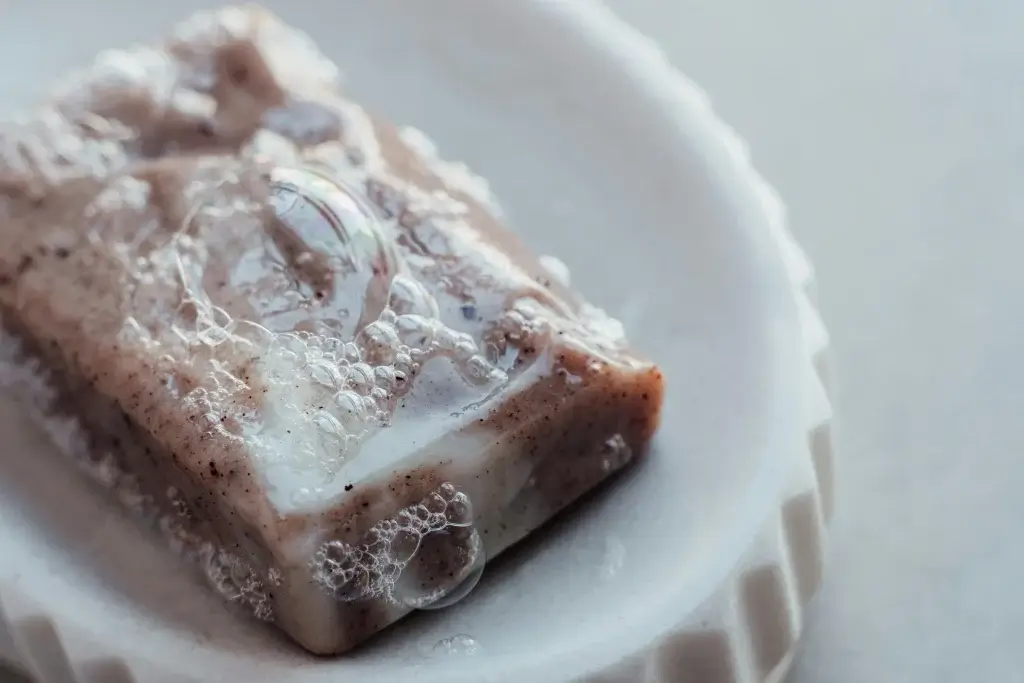
Use Bar Soap Instead of Shower Gel
As we always say, everyone can afford a bar of soap. And where personal hygiene and skincare are concerned, it’s probably the most fundamental budget product there is.
For several years, I’ve been using bar soap for my body instead of shower gel. It’s more affordable and lasts longer.
Pine tar was my favorite for many years, but wouldn’t lather when showering cold. This is when I discovered a superfatted curd soap that can be used for the body, face, and hair, even with very dry skin.
As already mentioned, I’m bald, but I did notice an improvement in the condition and thickness of my facial hair.
By the way, if you’re a mature man and have developed the so-called “old people’s smell,” you can neutralize this with Japanese persimmon soap, which will allow you to use less cologne.
Use Multi-Functional Skincare Products
Not only can you save by purchasing budget skincare products but also by having fewer.
Nivea Creme for Very Dry Skin of the Face and Hands
If your facial skin is very dry and chapped, apply original Nivea Creme (or equivalent) combined with oil. Anything will work, whether it’s baby oil or the cooking oil on your kitchen shelf. But it’s probably best to choose one suitable for your skin type; take a look at the below table, where you’ll also find more on oils.
Just mix equal portions of cream and oil and ply thickly over your face and neck before going to bed. It will also leave beards and mustaches well-conditioned.
For dry, weather-beaten hands, mix boiling water and original Nivea Creme (or equivalent) to a ratio of 1-to-2, respectively, and apply while still warm. Cover your hands with cotton gloves, which are available for next to nothing at most drugstores, and allow to work overnight.
Zinc Paste
Instead of deodorant, spread a tiny amount of zinc paste under your arms. This keeps me odor-free for up to a week, depending on season.
If I’ve run out of my prescription cream, I also apply it during flare-ups of neurodermitis. And it can be used to relieve itching piles.
Budget Skincare with Oils
Cleanse with Oil
Oils can be a great help when overcoming skin conditions. Apart from massaging them into the affected area like an ointment, they can also serve as a facial cleanser.
This is how it’s done:
- Wet your face with lukewarm water.
- Apply a few drops of oil (see the below table).
- Massage to form an emulsion.
- Rinse with cold or lukewarm water.
- Remove residue with a cotton pad.
Condition Beards and Mustaches
There is no need to purchase extra beard oil.
Massage castor oil combined to a ratio of 1-to-1 with jojoba oil into your beard and mustache at night. Not only does this nourish facial hair, it also protects it from breakage through friction as it rubs on your pillow.
Treat Wrinkles
Or you can apply it to your whole face to diminish the appearance of wrinkles and fine lines.
Both these oils are noncomedogenic, meaning they won’t block pores if you’re acne-prone.
In case you exchange jojoba for another oil, make sure it’s of a thinner consistency than the castor oil.
| Oil | Benefits |
|---|---|
| Hawaiian Kukui Nut Oil | Heals sun damaged skin. |
| Almond Oil | Repairs the skin’s natural barrier. Ideal for mature and sensitive skin. |
| Castor Oil | A good moisturizer for the skin and hair. It’s anti-inflammatory and speeds up the healing of wounds. |
| Jojoba Oil | Soothes rashes and inflammations. Relieves itchiness. Noncomedogenic. Ideal for oily and acne prone skin. |
| Elderberry Oil | Antioxidant properties. Absorbs easily, making it suitable for daytime use on face and body. Can also be applied beneath moisturizer in place of serum. |
| Sea Buckthorn Oil | Also called “sallow thorn” or “sandthorn” oil. Rich in vitamin E and pro-vitamin A. Anti-aging properties. |
| Musk Rose Oil | Effective in the treatment of scars. |
| Evening Primrose Oil | Soothes and smooths rough and sensitive skin. Effective in the treatment of neurodermatitis. |
Petroleum Jelly
Petroleum jelly is another multi-functional product essential to budget skincare.
Slugging
“Slugging” is when you apply petroleum jelly over your moisturizer and other skincare products at night to intensify their effect.
I do it a couple of nights a week and notice that my skin seems more hydrated.
For Lips, Feet, Elbows, and Cuticles
Apply petroleum jelly to heal cracked lips, feet, and elbows, and to soften cuticles. Alternatively, try castor or coconut oil.
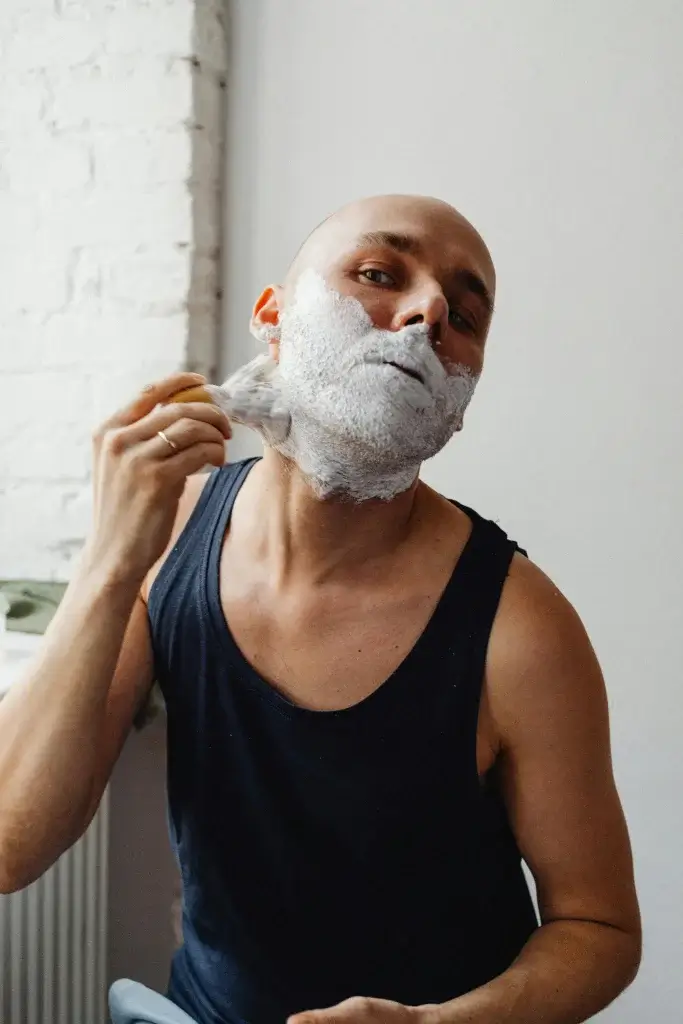
Shave Cheaply with a Safety Razor
It’s surely a no-brainer if you’re contemplating skincare on a budget: Double-sided razor blades cost mere pennies, so why buy expensive cartridges?
Most men I speak to say they can’t use a safety razor without cutting themselves. That’s because they’re not lathering up with a brush and shaving soap, which is essential to raising the whiskers.
And if you want to get really close, regardless of the type of razor you choose, shave with cold water. This will also minimize bleeding in case you do cut yourself.
Pre-Shave Oil
A pre-shave oil will create a barrier between your skin and your shaving soap, which is beneficial if you’re acne-prone or have dry skin. It also prevents razor bumps and rashes, as well as further reducing the risk of cutting.
But you don’t have to buy a product labeled “Pre-Shave Oil.”
Any oil will work, including baby and cooking oil. But I’d recommend choosing from the above table.
Lighter oils are best as a pre-shave. I use the same jojoba oil that I use to nourish my mustache at night.
Simply massage into the beard area before lathering up.
© 2024 J. Richardson
Related Posts
Disclaimer
The information provided by The Neat and Tidy Man (“we,” “us,” or “our”) on theneatandtidyman.com (the “site”) is for general informational purposes only. While we endeavor to keep the information up to date and correct, we make no representation or warranty of any kind, express or implied, regarding the completeness, accuracy, reliability, suitability, adequacy, validity, or availability of any information on the site. Under no circumstance shall we have any liability to you for any loss or damage of any kind incurred as a result of the use of the site or reliance on any information provided on the site. Your use of the site and your reliance on any information on the site is solely at your own risk.

